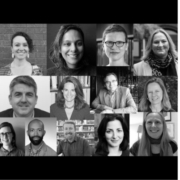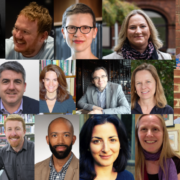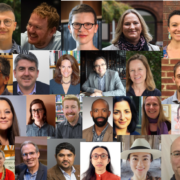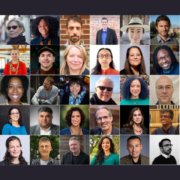The FreshEd Questionnaire, Vol. 7
Supervision
Today we continue our mini-series called the FreshEd Questionnaire. I’ve been asking guests a set of standard questions after each interview.
These questions focus on how guests approach writing, reading, research, and supervision. These are the day-to-day activities we do inside universities, but we don’t talk too much about them. I want to talk about them to highlight the many different approaches. I think these insights will be valuable to students, especially those that are about to start graduate school.
Guests in this Mash-up:
Tricia Bromley
Neal Hutchens
Amy Shuffelton
Dave Cormier
Elena Aydarova
Joshua Ehrlich
Jesica Oddy
Steven Lewis
Rebecca Spratt
Nidal Al Haj Sleiman
Liz Shchepetylnykova
Irv Epstein
Sirojuddin Arif
Karen Mundy
Leonardo Garnier
Audrey Bryan
Kirsi Yliniva
Gita Steiner-Khamsi
Citation: Bromley, Patricia, Hutchins, Neal, Shuffelton, Amy, Cormier, Dave, Aydarova, Elena, Ehrlich, Joshua, Oddy, Jessica, Lewis, Steven, Spratt, Rebecca, Sleiman, Nidal Al Hah, Shchepetylnykova, Liz, Epstein, Irv, Arif, Sirojuddin, Mundy, Karen, Garnier, Leonardo, Bryan, Audrey, Yliniva, Kirsi, Steiner-Khamsi, Gita with Will Brehm, FreshEd, 361, podcast audio, July 29, 2024. https://freshedpodcast.com/361-questionnaire/
Patricia Bromley 3:09
Patricia Bromley, I’m an Associate Professor of Education and Environmental Social Science at Stanford. For supervising PhD students, I love a model that’s really an apprenticeship model. So, working with students on projects, and ideally a big project that has multiple students who are at variable stages in their careers. The peer learning and peer support that goes on in that is really valuable, as well as working closely with me and other faculty and learning directly from us on our projects. So, apprenticeship and group apprenticeship is my preferred way. I think that graduate students should work closely with faculty if they can, co-author projects, work as RAs on faculty projects, in addition to pursuing their own projects. I think, trying to work closely with faculty members and understand how they have come to think the way they do, even if a student doesn’t agree or doesn’t really want to do that kind of work, to still try to just learn as much as they can. It’s a long road trying to learn how to do academic research.
Neal Hutchins 4:21
Neal Hutchins and I am a Professor at the University of Kentucky, and I’m assuming when we say supervision, this means in relation to working with students. When I work with students, I think a couple of things come to mind. One is that students are individuals, and the needs that they have in terms of their learning and professional and scholarly development are at different places. And so, I think it’s really important to understand where they are and to tailor the advice and suggestions and guidance to where they are. I also think that at the end of the day, one of the most important lessons is that it is about the student. It’s not about me, and it’s about letting them go to where they need to be. Even while you are balancing all the challenges and the roadblocks that can come with graduate study, don’t lose that sense of awe and curiosity that took you to engage in advanced study in the first place, hold on to it with tenacity.
Amy Shuffelton 5:22
I’m Amy Shuffelton. I’m a Professor of Philosophy at Loyola University, Chicago. Well, I teach undergraduates, and I teach some graduate students, and I’ve advised PhD students as well. I very much treat all of these kinds of supervisions as an opportunity to think together about ideas that are interesting. So, I’ve lately moved very much away from grading students, in part, because I think that pits them against each other and them against me, and me against them in ways that I don’t like. And I would much rather think about it as we’re reading a bunch of books together and generating a lot of ideas together and talking about things that are important in the world, which is a very non-authoritarian or non-supervisory supervision, but I kind of like to get projects spinning and then let the projects supervise themselves. Find out what professional society or professional community, but those are usually represented by professional societies best represents your interests, and get involved with it, because it’s a great way to meet people who are outside your limited university context, and you can meet people from you know all over your city, your state, the world, and get better access to great ideas.
Dave Cormier 6:29
My name is Dave Cormier, I’m a Learning Specialist at the University of Windsor. I’m responsible for digital learning strategy and special projects. So, I’m actually in a PhD program, so I can speak to that kind of supervision. I think, as a mature student, a lot of people in the programs are. It’s one of those things that I think needs to be negotiated. I think there’s a lot of power inside of the supervision, that supervision process. I think it used to be for generations. And I mean, you go all the way back to the very first master’s programs at the University of Paris, they have a quad level discussion, they all sit down, and all the masters sit around and decide whether or not you can now join us. And I think there’s still whispers of that in the processes that we have. And for me, I need a little bit more negotiation than that. And the same with my own students whenever I work with them. I’m always trying to get them to the point where they can negotiate what success is going to look like for them. And so, it’s that process I’m always looking for. I think for a new graduate student, just be very focused on the thing you’re trying to get done. The advice that I’ve heard and have given many, many, many times is you are not changing the world with your graduate work. You are trying to learn the skills that allow you to change the world. And so, focus on the skills when it comes to big projects and stuff, make those projects a little bit smaller, and focus on getting them done.
Elena Aydarova 7:40
Elena Aydarova, Assistant Professor University of Wisconsin, Madison.
Will Brehm 7:43
So, what would you say your preferred method of supervision is?
Elena Aydarova 7:47
Dialog. I enjoy asking students questions. I enjoy listening to their stories, and I enjoy being in a conversation that allows me to imagine, together with my students, what they dream of becoming and how I could support them towards those dreams.
Will Brehm 8:04
What would be one piece of advice you have for a new graduate student?
Elena Aydarova 8:07
It’s hard to make it one. The most important one is read. Read a lot, read all the time, read a lot of good stuff. Ask people how they read and follow their advice. Another thing that I would add is also remember that a lot of graduate work and research work is about relationships. So, as you are navigating your scholarly identity, be thinking about the communities to which you belong, but also the relationships that you develop, because in the long run, that’s what’s going to sustain you as a scholar.
Joshua Ehrlich 8:39
I’m Joshua Ehrlich. I’m an assistant professor at the University of Macau. My preferred method of supervision gives the students a lot of responsibility for their own education. I try to teach them independence and make them responsible for asking for what they need, rather than trying to give them a worked-out blueprint for how to write a thesis or how to complete their courses. I think that’s one of the main things I find myself doing, is trying to instill a sense of responsibility and of motivation. And that can be hard to do, but I think it’s really important.
Will Brehm 9:14
What would be one piece of advice you’d give to a new graduate student?
Joshua Ehrlich 9:18
Take a lot of languages. Rather than wait and find out what you need, dive into language training early on.
Jessica Oddy 9:24
My name is Jessica Oddy, and I am a researcher at the University of Bristol. My preferred supervision method is in-person conversation. My one piece of advice would be to read and write often. Every article that you read, write a summary and make sure that you have a good referencing system from the very beginning.
Steven Lewis 9:48
Steven Lewis, Associate Professor at Australian Catholic University. I think I’m a supervisor who likes to talk and think with their students. So, I very much see it as a case of I’m here to learn as much as I’m here to teach. And I think, as much as the student is willing to engage in that and follow me down rabbit holes and blind ends, I’m very much here to learn from my students, as much as I am to guide them and supervise them. When in doubt, read. If you think you know something, keep reading, because you will always win the argument if you’ve read more. And that’s an argument with yourself as much as it is with anybody else. The more that you can justify and explain and rationalize the decisions you make, whether it’s a theory, whether it’s a concept, whether it’s a decision in your research, you know, you’ll always be a better student and a better scholar for it.
Rebecca Spratt 10:31
Hi, I’m Rebecca Spratt, and I’m just finishing my PhD at Australian Catholic University. As someone who’s just been supervised for the last four years, I think my preferred supervision method is one in which the supervisor is interested in you as a person, not just as a student, not just in your academic trajectory, but who you are as a person and where you want to be and what impact you want to have on the world. Choose your supervisor wisely and choose someone that you feel comfortable to ask questions of. And as a general piece of advice, ask questions. Ask as many questions as you can, would be my advice.
Nidal Al Haj Sleiman 11:08
My name is Nidal Al Hajj Sleiman, I’m a postdoctoral research fellow at Austin University’s School of Education. I think conversations are the most important because it gives students the opportunity to process their thoughts, and at the same time, supervisors can offer guidance or some suggestions while in a dialog with a student. But this might not be sufficient, because supervisors should also be looking at student writing and offering guidance to improve style and structure.
Will Brehm 11:38
And what would be one piece of advice you have for a new graduate student?
Nidal Al Haj Sleiman 11:41
I would say two if that’s okay; read widely and get organized as early as possible.
Liz Shchepetylnykova 11:46
My name is Liz Shchepetylnykova, and I’m a PhD candidate at the University of Hong Kong. So, I came into academia as a practitioner with years of experience working in higher education, and because of that, I’ve really appreciated learning by doing kind of approach. I feel that as a scholar-practitioner, I’ve learned so much from engaging and cooperating with my peers as well as experienced scholars, but also always making sure that I’m still in touch with my fellow practitioners back in the field because they have the most nuanced and the most contextualized knowledge and understanding of the things that are happening on the ground. And having one foot in one world, if I may, and the other one in this academic setting, I’ve really enjoyed the opportunity to bridge those two perspectives and create a more comprehensive and more nuanced vision of the challenges that we are facing in higher education. Be patient and be persistent. The PhD process or any graduate school experience could be very long and keeping your eyes on your long-term goals and keeping your work up is what surely gets you there.
Irv Epstein 13:10
So, my name is Irv Epstein. I’m an Emeritus Professor of Peace and Social Justice at Illinois Wesleyan University. So, I would say that with regard to supervising students, I really try to ask students what they want and what they want to do, and then I can give them some information, some readings, or some places to look, and then they come back, and then we talk. And I think what’s most important for me is that students have a sense of ownership of the intellectual project. And so, I don’t wish to impose upon them any preconceived notions or ideas. What I would say to new graduate students is to really own the experience, and don’t make compromises to start off, right? So, to the extent that you have freedom, you choose the classes you want to take because of your interest. You choose your research projects and your thesis ideas on the basis of what you want to do. It’s your work. It’s your product. And there may be pressures. There are obvious pressures to replicate work that others have done. There are pressures with regard to employment and what’s marketable, and I would say, ignore that to the extent that you can, because it’s a reflection of who you are. And to be true to yourself, for the amount of time and effort that’s going to go into this graduate experience, you need to have a sense that whatever happens, I’m proud of what I’ve done for myself.
Karen Mundy 14:42
Well, I’m Karen Mundy, and I’m a professor in the Ontario Institute for Studies in Education at the University of Toronto. You know, I really enjoy working with graduate students. And I don’t know if I have a preferred method. I think my method is; listen to what the problem is that they want to do research on, listen to what they think the challenges are going to be, pose alternative ways of thinking about those challenges, and then let them go at it. And when they come back or fall off the horse, which always happens, then sit down and discuss, okay, let’s break this down into its component parts. How can we get to the finish line? Do I have to give one? I never give one piece of advice to anybody. Well, not to my own kids, but I guess I might just say, you know, try to fill your basket in the first years. And by that, I mean read theory, read research. Don’t just dive into a piece of research without really thinking broadly about that problem, and not only the research from the last five years, go back a little bit and understand how that field of knowledge has developed.
Sirojuddin Arif 15:52
My name is Sirojuddin Arif. Now I’m the head of MA in Political Science program at Universitas Islam International Indonesia. Personally, I would like to have my students learn by themselves. They engage in the subject that they are learning without me as a supervisor directing closely or micromanaging the student. So, that’s the general preference. I would like to have my students engage in the subject that they are learning. They might come to me to ask questions, but it is the student’s responsibility to do the task. But somehow, I also need to be adaptive in the sense, I have to look at my students to the point whether these students are capable of doing things themselves with more direction, or I have to go further to trigger right, to provide them with more hints, with more direction, how to pursue their project, for example. So, maybe, in one word, maybe my style is adaptive. Read, read and read.
Audrey Bryan 16:56
My name is Audrey Bryan. I’m an Associate Professor of Sociology at the Dublin City University Institute of Education. I don’t think I’ve ever really thought of myself as employing a particular method of supervision, but I do think it’s important to meet students where they are and to be able to adapt your approach depending on each student’s relative strengths and challenges. So, thinking of one student that I worked with who, by her own admission, was like a magpie who was attracted to shiny things. So, she had a really hard time settling on a given research question, or, you know, settling on a particular theoretical framework, and I discovered through our conversations that there were a lot of kind of psychological barriers that were affecting her ability to kind of advance her work. And it was through getting to know her that, you know, I was able to, I think, help her navigate through some of those challenges. I think one of the kinds of general things I would say, though, is that feedback is absolutely critical. I was actually recently having a conversation with a friend who’s taking a creative writing course, and she was talking about some guidance that they had been given in terms of how to give feedback to peers. And one of the things that the creative writer who was hosting these sessions suggested was this, you know, being mindful of this distinction between paranoid reading or you’re reading to kind of find problems and poke holes and criticize for the sake of criticizing, versus what she called compassionate feedback and compassionate reading. And I thought this was a really kind of useful distinction, because I think sometimes academics are socialized to, you know, engage in these paranoid reading practices, and I just don’t think they’re particularly constructive or helpful. So, I think, you know, reading and giving feedback with compassion, where you’re amplifying the strengths of the work and making very constructive recommendations is absolutely crucial. It would be to read voraciously and to embrace theory, to read classic and original texts so that they can develop a strong sense of who they are like, just to develop a strong intellectual identity. I think we develop that through engaging with theory. I think sometimes, you know, in education, students who are coming from more of a practitioner background can be quite reluctant and fearful of engaging with theory. And one of the kind of ways into that -you know, when I was a graduate student, my advisor’s advice to me was because, yeah, I was working with Pierre Bourdieu, and I just found the original text kind of a little bit inaccessible at that point. And his suggestion was, you know, to initially read thinkers who had analyzed the theory, and then from there, go to the original source and go to the original text. And, yeah, I found it really, really helpful. But yeah, not to shy away from theory. Theory really is absolutely central and vital to the research process.
Leonardo Garnier 20:14
Yeah. My name is Leonardo Garnier, and I’ve been a Professor of Economics at the University of Costa Rica for quite a long time. I was a minister of education in Costa Rica, and I was a special advisor for the Transforming Education Summit at the UN. I think basically what I enjoyed doing is making my students feel uncomfortable with the first steps they gave in the process. So, they come to you with something that is almost according to them, almost finished, and then you start asking questions, then make them doubt and say, Oh, it wasn’t that easy. So, question yourself, ask yourself, why this? Why? Why? Why? And this is especially important in economics, because a lot of research in economics is very sophisticated in the technique, but usually about quite irrelevant questions. So, when I see my students doing this big model of something, I say, you’re doing that for what? What is the goal that you’re trying to achieve? And that doesn’t mean don’t use the sophisticated techniques, of course, use it, but for a purpose. That’s what I enjoy doing. And it’s quite funny. I’d say two things that, in fact, are, one is that you have to enjoy what you do, and you have to work very hard. And I don’t know why, sometimes in education, people say, Oh, now the important thing is that they should enjoy themselves. And I say, Well, you have to enjoy yourself, of course, but you have to work very hard. I mean, if you want to become a very good pianist or a violinist, yes, you have to enjoy it, but the 10 minutes of the concert have 1,000s of hours of very boring practice behind. So, enjoy it, but you have to work very, very hard. And the other part is to enjoy those who work with you. Don’t do it alone. Meet other people, talk to them, engage because academics can become quite an ugly place.
Gita Steiner-Khamsi 22:02
I’m Gita Steiner-Khamsi, and I have been appointed the William Heard Kilpatrick Professor of Comparative Education at Teachers College Columbia University, and at the same time, by courtesy of the Geneva Graduate Institute, I’m also the UNESCO Chair of Comparative Education Policy. I would think it is an apprenticeship model where I collaborate with students and give a lot of feedback to their work, and they learn from collaborating with me. Think of where you want to be in five years.
Kirsi Yliniva 22:34
So, I’m Kirsi Yliniva. I work in the University of Oulu Finland, and I’m a PhD researcher there, and I also affiliate in the University of Helsinki Finland, and I am also a part time university teacher in the University of Oulu. Well, I prefer face-to-face supervision, and also that my supervisor comments by straightly writing on my paper. But I also very much prefer the group seminars where the participators can present their papers and ideas and get feedback from the others. I really recommend that you pick a topic which truly interests you, not something, that you think that you should choose, or it’s going to interest others. I think it’s very important that you are very interested on your topic, so that you have the strength to work with the subject.
Want to help translate this show? Please contact info@freshedpodcast.com
Have any useful resources related to this show? Please send them to info@freshedpodcast.com









